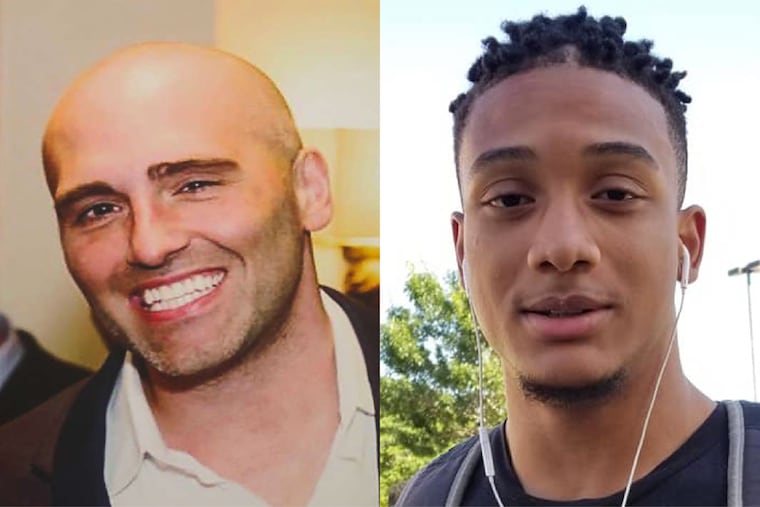Accused Rittenhouse stabber will testify that victim used racial epithet during fatal scuffle, lawyers say
The allegation marked the first time that Schellenger, 37, has been accused in official proceedings or court documents of using a racial slur during the dispute with Michael White. Prosecutors disputed it, saying their investigation did not turn up evidence supporting the claim.

A 22-year-old man accused of fatally stabbing real estate developer Sean Schellenger near Rittenhouse Square last summer will testify that Schellenger initiated a confrontation and used a racial epithet during the scuffle, his lawyers said in court Friday.
The allegation, offered during a brief hearing for Michael White, was the first time that Schellenger, 37, has been accused in official proceedings or court documents of using a racial slur during the encounter at 17th and Chancellor Streets between the men, who did not know each other. White is black and Schellenger was white.
Prosecutors disputed the claim, with Assistant District Attorney Anthony Voci telling Common Pleas Court Judge Glenn B. Bronson that prosecutors did not have evidence that Schellenger used a racial epithet.
Bronson also told White’s attorneys, public defenders Jonathan Strange and Dan Stevenson, that he had not seen evidence of epithets in the pieces of the case he had reviewed.
Still, Strange said that “Mr. White will say that” at trial, without specifying what language White would say Schellenger used. White is scheduled to be tried starting on Oct. 7.
The allegation was part of a set of arguments over potential trial evidence; White’s lawyers hope to convince a jury that he acted in self-defense. It is also likely to add controversy to a case that has attracted widespread attention, in part because it seems to exemplify elements of the city’s long-standing tensions over race and class.
White sat silently through Friday’s hearing. Schellenger’s parents, Linda and Mark, were in the gallery and declined to comment afterward, citing a gag order placed on the case. That also prevented attorneys from commenting outside the courtroom.
Authorities have accused White of stabbing Schellenger after a brief confrontation on a side street near the square on the night of July 12, 2018, where there was a traffic tie-up. Witnesses testified last year that White — who was working as a food courier — plunged the knife into Schellenger’s back after Schellenger, who had been drinking and socializing with friends at the nearby restaurant Rouge, wrapped his arms around White in a wrestling move.
Schellenger’s blood alcohol level at the time was more than twice the legal driving limit, prosecutors said previously, and a test after his death found a trace of cocaine in his system, although it did not indicate when Schellenger may have used it.
Strange and Stevenson also argued in motions filed in recent weeks that they should be permitted to tell jurors about Schellenger’s past brushes with the law to demonstrate that he had a history of violence and aggression.
Bronson ruled Friday that they could bring up a 2008 incident in Florida, when Schellenger, then 27, brawled with and bit bouncers at a restaurant around 2 a.m. He was permitted to enter a diversionary program and avoid a conviction.
But the judge ruled that White’s lawyers could not introduce evidence about a 2001 incident when Schellenger — then a student at Pennsylvania State University — broke into a State College house and then tried to resist arrest. Bronson said the case was too old and not relevant to whether Schellenger would have been the aggressor in his confrontation with White.
The lawyers also wrote in court documents that Schellenger pleaded guilty to a summary offense in 2009, after he was pulled over in Upper Merion Township and found with a small amount of marijuana and $68,500 in cash.
Bronson told the lawyers they could raise that incident with witnesses only if prosecutors called character witnesses to try to paint Schellenger as “law-abiding.”
In addition to his murder charges, White is awaiting trial on counts including theft for allegedly trying to steal a mountain bike owned by the University of Pennsylvania. He has been free on bail since last August, when District Attorney Larry Krasner’s office downgraded White’s case in the slaying to third-degree murder ahead of White’s preliminary hearing.
Schellenger’s relatives criticized that decision, which also meant White would not face the possibility of an automatic life sentence. If convicted of third-degree murder, White could face a prison sentence of up to 20 to 40 years.